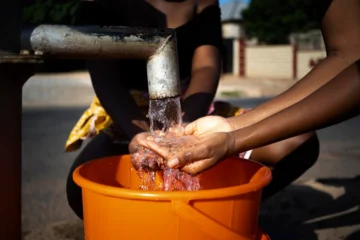Finding a bad smell, especially one like sewage, in your well water is worrying. Your well is supposed to provide your family with safe and dependable drinking water, and you don’t want it to have any unpleasant smells.
Different things can make your well water smell like sewage, from bacteria to minerals building up. These problems might need quick action. Understanding the possible reasons and using the right solutions can make sure your water stays safe, clean, and without any bad smells.
In this article, we’ll discuss why water can have a funny smell, what causes it, and provide easy tips to ensure your water tastes and smells good. Say goodbye to unpleasant surprises and just enjoy a fresh and tasty drink every time!
Most Common Reason of Sewage-Like Smell
To fix a stinky water problem, start by figuring out where the smell comes from. Check out this chart to help you find possible sources.

1. You Have Sewage near Your Well Water System
The main reason for a sewage smell in your water could be actual sewage contamination. This happens when a septic system malfunctions or if floodwaters with sewage get into the well. The bacteria and pathogens in sewage create a sewage-like smell and, importantly, a health risk.
If you suspect this, stop using the water right away and get professional help. A thorough water test can confirm if there’s a septic issue, followed by actions like well chlorination or fixing the septic system.
2. Bacteria Are Growing in Your Drain (By Produce Hydrogen Sulfide Gas)
If your well water has a sewage-like smell, don’t forget to check the drain, it’s a commonly overlooked source. Over time, things like food particles can build up in the drain, creating an ideal environment for bacteria to thrive. Serratia marcescens, a specific type of bacteria, feeds on this organic matter and forms biofilm colonies.
When these bacteria break down the organic material, they release gases that smell like sewage or rotten eggs, giving the impression that the odor is from the water itself. Regular and thorough cleaning of the drains can prevent this bacterial growth and the associated smells.
3. Rotten Egg Smell Due To Iron or Sulphur in Your Well Water Source
A sewage-like smell in your water may also stem from iron or Sulphur. Naturally occurring specific bacteria thrive on these minerals. Sulphate-reducing bacteria (SRB) and iron bacteria, for instance, use Sulphur and iron in their metabolic processes.
The by-product of this metabolism is hydrogen-supplied gas, which smells like rotten eggs or sewage. If these bacteria are in your well, they can generate enough hydrogen sulphide to cause an unpleasant odor in your water. To find out if this is the issue, test your water for these elements.
4. Sulphur Bacteria in Your Water Heater
Bacteria aren’t limited to drains or wells, they can also grow in your water heater. This is particularly true if your water heater’s temperature setting is too low. Lower temperatures provide an ideal environment for specific bacteria, including those producing hydrogen sulphide, to thrive.
Moreover, if your water contains sulfur, these bacteria can utilise it to generate even more hydrogen sulphide gas in the warm setting. To prevent this, ensure regular servicing and maintain suitable temperature settings in your water heater.
How to Fix Sewage Like Smell on Well Water?
To resolve the unpleasant odor, start by identifying its cause, this is the initial step in fixing the issue. Each of the solutions below aligns with the potential problems identified above.
1. Cleaning
Unpleasant odors in your drains often result from a buildup of bacteria. However, a thorough cleaning can effectively resolve this issue. You can use a homemade solution of vinegar and baking soda to dissolve minor clogs and disinfect the drain.
For more stubborn biofilm colonies, consider using a specialized drain cleaner designed to break down organic matter and eliminate bacteria.
Additionally, it’s advisable to regularly flush your drains with hot water to prevent the accumulation of food particles and other organic matter that bacteria thrive on. Proper disposal of kitchen waste, especially oils and fats, is also crucial in preventing bacterial buildup.
2. Test Your Well Water
It’s crucial to test your water to confirm the existence of elevated iron, sulfur, or other substances that could be causing the odor. Comprehensive water tests can assess different factors such as pH, hardness, and the presence of specific bacteria or minerals.

These tests are typically easy to perform; you collect a water sample in a sterile container and send it to a lab for analysis. The results will offer detailed insights into the water’s composition.
If iron or sulfur levels are elevated, you may need to consider investing in a specialized water treatment system to eliminate these minerals and prevent associated odors.
3. Service Your Hot Water Tank
If your water heater is causing an odor, bacterial contamination may be the culprit. Water heaters, particularly those set at lower temperatures, can create an ideal environment for bacteria to thrive. Regular servicing and cleaning of your water heater can effectively tackle this problem. A professional can flush the tank, eliminating any mineral build-up that bacteria might feed on.
Additionally, they can adjust the heater’s temperature settings to a level that inhibits bacterial growth, usually above 140 degrees Fahrenheit.
However, it’s important to ensure safety measures are in place to prevent scalding at these higher temperatures.
4. Shock Your Well With Chlorine (To Remove the Bad Water Smell)
When well water is contaminated with sewage or harmful bacteria, a common and effective disinfection method is well shocking. This process entails introducing a potent chlorine bleach solution into the well and allowing it to circulate through the water system.
The high concentration of chlorine effectively kills bacteria and other microorganisms, ensuring the well and water pipes are sanitized. It’s crucial to let the chlorinated water stand in the system for at least 12 to 24 hours to ensure thorough disinfection.
After this period, the system should be thoroughly flushed to remove the chlorine before using the water. It is advisable to have professionals carry out this process to ensure it is done safely and effectively.
5. Invest in Advanced Water Filter (A Profession Recombination)
To guarantee your water stays clean, safe, and free of odors, consider investing in a high-quality water filter. A reliable water filter can effectively eliminate bacteria, minerals, and other contaminants that could be causing the sewage smell.
When choosing a water filter, it’s essential to understand the specific requirements of your water source. Regular water testing is vital to identify the contaminants that need removal. Additionally, explore whole house filters known for their easy maintenance and positive reviews regarding longevity and performance.
Effect of Sewage Smell On Your Health

Health risks associated with exposure to sewer gas include:
1. Hydrogen Sulfide Poisoning
Hydrogen sulfide has a distinct rotten egg odor, even in low concentrations. Exposure to low levels of hydrogen sulfide can lead to eye and respiratory irritation. Few Symptoms Include:
- Dizziness
- Drowsiness
- Headaches
- Nausea
- Nervousness
At higher concentrations, it can affect the sense of smell, making it challenging to rely on the gas’s odor as a warning sign. In extremely high concentrations, hydrogen sulfide can result in loss of consciousness and, in severe cases, even death.
2. Suffocation
Elevated levels of methane in confined spaces reduce the oxygen content in the air, leading to the risk of suffocation. Symptoms of lack of oxygen include;
- Dizziness
- Headaches
- Nausea
- Unconsciousness
Extremely low oxygen concentrations, below 12%, can swiftly result in unconsciousness and, ultimately, death without warning. The highest concentrations of sewer gas typically accumulate where it enters the home, often in basements.
Conclusion
Discovering a sewage-like smell in your well water is a cause for concern due to its impact on taste, odor, and potential health risks. The article explores various reasons behind the unpleasant smell, including sewage contamination, bacterial growth in drains, and the presence of iron, sulfur, and bacteria in the water heater.
Emphasizing the importance of promptly identifying and addressing the root cause, practical solutions are outlined, such as thorough cleaning, water testing, water heater servicing, chlorination, and investing in effective water filters.
The article also highlights the health risks associated with sewer gas exposure, including hydrogen sulfide poisoning and suffocation. By following the recommended steps, individuals can ensure their well water remains safe, clean, and free from unpleasant odors, promoting the overall well-being of their households.
FAQs
Why does my well water smell like sewage?
The presence of sulfur bacteria or hydrogen sulfide gas in the water can cause a sewage-like odor. This is often due to natural processes in the well or contamination.
What causes a sewage odor in well water?
The primary cause is the breakdown of organic matter in the water, leading to the production of hydrogen sulfide gas. Bacterial activity in the well can contribute to this issue.
Is it safe to drink well water if it smells-like sewage?
While the odor itself is unpleasant, it doesn’t necessarily indicate harmful levels of contaminants. However, it’s crucial to test the water for safety and address the issue to prevent potential health risks.
How to get rid of the sewage smell in well water?
Treating the water with aeration systems, activated carbon filters, or shock chlorination can help eliminate the sewage smell.
Can bacteria or contaminants be responsible for the sewage smell in well water?
Yes, sulfur bacteria and certain contaminants can contribute to the unpleasant odor. Regular well maintenance and testing are essential to ensure water safety.





